Hyundai Santa Fe vs Toyota Proace Bus – Differences & prices compared
Compare performance, boot space, consumption and price in one view.
Find out now: which car is the better choice for you – Hyundai Santa Fe or Toyota Proace Bus?
The Hyundai Santa Fe (SUV) comes with a Full Hybrid or Plugin Hybrid engine and Automatic transmission. In comparison, the Toyota Proace Bus (Bus) features a Electric or Diesel engine with Automatic or Manuel transmission.
When it comes to boot capacity, the Hyundai Santa Fe offers 711 L, while the Toyota Proace Bus provides 0 L – depending on how much space you need. If you’re looking for more power, decide whether the 253 HP of the Hyundai Santa Fe or the 177 HP of the Toyota Proace Bus suits your needs better.
In terms of consumption, the values are 1.70 L per 100 km for the Hyundai Santa Fe, and 24.20 kWh7.30 L for the Toyota Proace Bus.
Price-wise, the Hyundai Santa Fe starts at 49000 £, while the Toyota Proace Bus is available from 31600 £. Compare all the details and find out which model fits your lifestyle best!
Hyundai Santa Fe
The Hyundai Santa Fe offers a refined blend of style and functionality, making it a strong contender in the SUV market. Its modern interior, combined with advanced technology and comfort features, creates an inviting and practical driving environment. With its sleek design and robust performance, the Santa Fe is well-suited for both urban commutes and family adventures.
details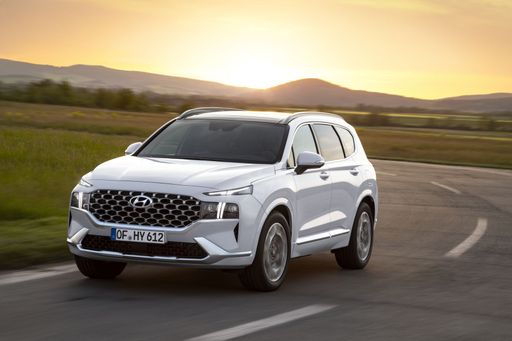 @ hyundai.news
@ hyundai.news
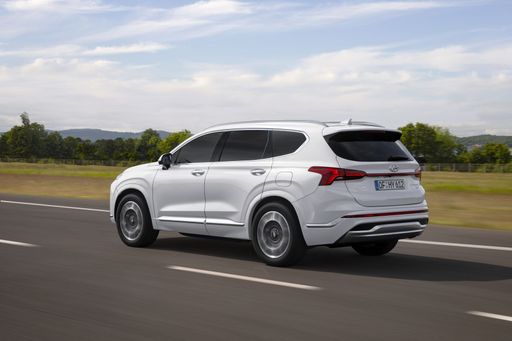 @ hyundai.news
@ hyundai.news
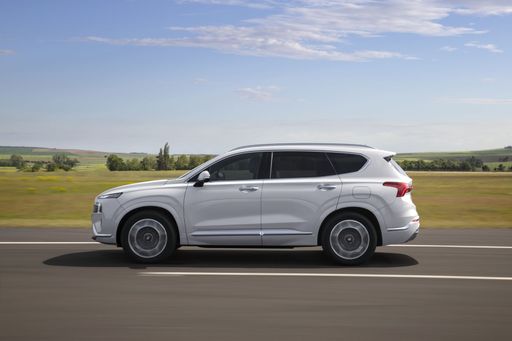 @ hyundai.news
@ hyundai.news
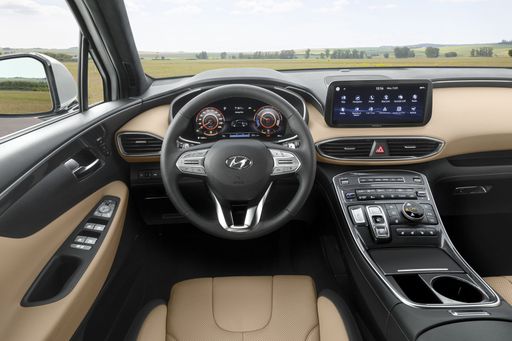 @ hyundai.news
@ hyundai.news
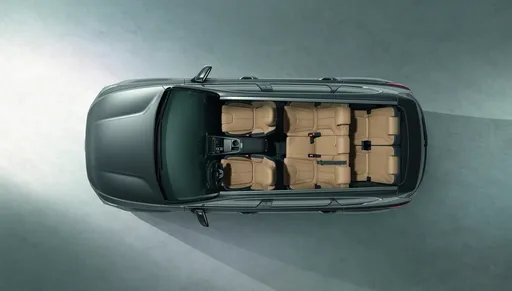 @ hyundai.news
@ hyundai.news
Toyota Proace Bus
The Toyota Proace Bus offers a versatile and practical solution for those in need of spacious passenger transport combined with a touch of comfort. Its interior is designed to maximise seating capacity while ensuring that both driver and passengers can enjoy a pleasant journey. With its efficient engine options and reliable build quality, this vehicle remains a popular choice for families and businesses alike.
details

|
|
|
|
|
Costs and Consumption |
|
|---|---|
|
Price
49000 - 58400 £
|
Price
31600 - 61800 £
|
|
Consumption L/100km
1.7 - 7 L
|
Consumption L/100km
7.3 - 7.4 L
|
|
Consumption kWh/100km
-
|
Consumption kWh/100km
24.2 - 24.4 kWh
|
|
Electric Range
54 km
|
Electric Range
218 - 343 km
|
|
Battery Capacity
-
|
Battery Capacity
-
|
|
co2
38 - 167 g/km
|
co2
0 - 193 g/km
|
|
Fuel tank capacity
47 - 67 L
|
Fuel tank capacity
69 L
|
Dimensions and Body |
|
|---|---|
|
Body Type
SUV
|
Body Type
Bus
|
|
Seats
5 - 7
|
Seats
5 - 9
|
|
Doors
5
|
Doors
4 - 5
|
|
Curb weight
1920 - 2165 kg
|
Curb weight
1835 - 2140 kg
|
|
Trunk capacity
621 - 711 L
|
Trunk capacity
0 L
|
|
Length
4830 mm
|
Length
4983 - 5333 mm
|
|
Width
1900 mm
|
Width
1920 mm
|
|
Height
1720 mm
|
Height
1890 mm
|
|
Payload
560 - 665 kg
|
Payload
825 - 1265 kg
|
Engine and Performance |
|
|---|---|
|
Engine Type
Full Hybrid, Plugin Hybrid
|
Engine Type
Electric, Diesel
|
|
Transmission
Automatic
|
Transmission
Automatic, Manuel
|
|
Transmission Detail
Automatikgetriebe
|
Transmission Detail
Schaltgetriebe, Automatikgetriebe
|
|
Drive Type
Front-Wheel Drive, All-Wheel Drive
|
Drive Type
Front-Wheel Drive
|
|
Power HP
215 - 253 HP
|
Power HP
136 - 177 HP
|
|
Acceleration 0-100km/h
9.3 - 9.8 s
|
Acceleration 0-100km/h
13.30 s
|
|
Max Speed
180 km/h
|
Max Speed
130 - 170 km/h
|
|
Torque
367 Nm
|
Torque
260 - 400 Nm
|
|
Number of Cylinders
4
|
Number of Cylinders
4
|
|
Power kW
158 - 186 kW
|
Power kW
100 - 130 kW
|
|
Engine capacity
1598 cm3
|
Engine capacity
1997 cm3
|
General |
|
|---|---|
|
Model Year
2024
|
Model Year
2024 - 2025
|
|
CO2 Efficiency Class
E, F, B
|
CO2 Efficiency Class
A, G
|
|
Brand
Hyundai
|
Brand
Toyota
|
Hyundai Santa Fe
Discover the All-New Hyundai Santa Fe: A Blend of Performance and Innovation
The 2024 Hyundai Santa Fe is not just a step forward in technology; it's a leap. Combining style with substance, this SUV brings cutting-edge features to the road, promising exceptional performance and enhanced efficiency. Let's explore the new offerings of this impressive vehicle.
Powertrain and Efficiency Explained
The Hyundai Santa Fe is available with advanced hybrid and plug-in hybrid engines, offering an environmentally conscious approach without compromising on power. The hybrid variant, featuring a 1.6 T-GDI engine, delivers a respectable 215 PS, whereas the plug-in hybrid tops the range with 253 PS. Both options pair seamlessly with an automatic transmission, ensuring a smooth and efficient drive.
Fuel consumption has also been a focus, with the hybrid achieving rates as low as 6.4 L/100km, and the plug-in hybrid boasting an impressively low 1.7 L/100km. The latter also offers an all-electric range of up to 54 km, making it a practical choice for city driving.
Advanced Driving Experience
Hyundai has placed a strong emphasis on creating an engaging driving experience. With a maximum torque of 367 Nm, acceleration from 0-100 km/h is achieved in just under 10 seconds, providing a responsive and lively performance on all terrains. Front-wheel and all-wheel drive options ensure you have the flexibility to choose the setup that best suits your driving style.
Next-Level Safety and Convenience Features
The Santa Fe is packed with a suite of safety features designed to provide peace of mind. Hyundai's SmartSense technology includes forward collision warning, blind-spot monitoring, and a rear cross-traffic alert. These innovations ensure that every journey is as safe as it is enjoyable.
Convenience is not overlooked either, with a spacious interior offering seating configurations from 5 to 7 seats. The boot space ranges from 621 to 711 litres, making it ideal for family trips and those with an active lifestyle. The advanced infotainment system keeps you connected on the go, ensuring you have everything you need at your fingertips.
Stylish Design and Comfort
The Hyundai Santa Fe's refined design combines robust SUV aesthetics with modern elegance. Its dimensions — 4830 mm in length, 1900 mm in width, and 1720 mm in height — provide a commanding presence on the road. Premium material finishes and high-quality upholstery add to the luxurious feel of the cabin.
Unmatched Value for Money
With prices ranging from €56,700 to €68,150, the Santa Fe represents substantial value for the range of technology and luxury offered. Monthly running costs and efficiency also mean that the Hyundai Santa Fe provides long-term savings for the discerning consumer.
Suitable for any lifestyle, the new Hyundai Santa Fe is poised to capture the attention of SUV enthusiasts, combining performance, safety, and cutting-edge technology in a beautifully crafted package.
Toyota Proace Bus
The Versatile Companion: Toyota Proace Bus
The Toyota Proace Bus stands out in the competitive MPV segment, offering a blend of practicality, efficiency, and innovative technology. Toyota has crafted this vehicle to cater to a wide array of needs, whether it be family outings, business transport, or electric motoring. Let's delve into the technical details and innovations that make the Toyota Proace Bus a compelling choice.
Engineering Excellence: Diesel and Electric Variants
The Proace Bus provides several powertrain options to meet diverse requirements. Customers can choose between robust diesel engines or an innovative electric drive system. Diesel variants feature a 2.0 D-4D engine available in various outputs, from 144 PS to 177 PS, supporting both manual and automatic gear options. The diesel engines deliver a balanced performance, with fuel consumption ranging between 7.3 to 7.4 L/100km.
On the electric front, the Proace Electric offers an enticing prospect for eco-conscious drivers. Equipped with a battery capacity of up to 75 kWh, this variant ensures a respectable range of up to 343 km on a single charge, while consuming between 24.2 to 24.4 kWh/100 km. The electric model delivers 136 PS, making it ideal for smooth urban driving.
Interior Innovation: Comfort Meets Functionality
The Toyota Proace Bus impresses with its versatile interior, accommodating 5 to 9 passengers comfortably. Various seating configurations are available depending on the version and needs, making it a perfect solution for both large families and shuttle services. Modern technology adorns the cabin, with a focus on comfort and connectivity, ensuring all passengers travel in style and enjoy seamless connectivity options.
Safety Features and Driver Assistance Technologies
Safety is paramount in the Proace Bus, featuring a plethora of driver assistance systems designed to protect both passengers and pedestrians. Advanced features include parking assistance, lane departure warning, and adaptive cruise control, providing peace of mind during long journeys.
Efficiency and Environmental Considerations
Balancing performance with environmental responsibility, the Proace Bus range includes models that meet various CO2 efficiency classes from A to G. The electric variant notably achieves zero CO2 emissions, making it an excellent choice for sustainable mobility. Furthermore, innovations in aerodynamics and weight management contribute to the Proace Bus's commendable efficiency metrics.
Conclusion: A Dynamic Choice for Modern Needs
The Toyota Proace Bus exemplifies Toyota's commitment to versatility, efficiency, and innovation. With its broad range of engine options, seating configurations, and state-of-the-art technologies, it serves multiple purposes while keeping operational costs in check. Whether for family, business, or eco-friendly motoring, the Proace Bus is a formidable contender in today's automotive landscape.
The prices and data displayed are estimates based on German list prices and may vary by country. This information is not legally binding.
